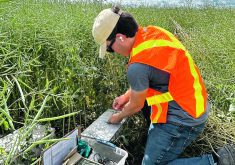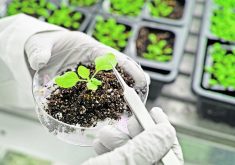Federal politicians are beginning to understand the importance of phosphorus sustainability and security, said Mavinic, who has developed technology to turn domestic sewage waste into quality phosphate fertilizer.
Mavinic, who spoke to MPs and senior bureaucrats at a breakfast lecture series in fall 2009, said Canada has to reduce, reuse and recycle phosphorus.
“Ever since then things have changed. Speaking to federal politicians recently, they’re very aware of what’s happening and starting to realize that we don’t have (phosphate rock) in Canada.”
Read Also

Research looks to control flea beetles with RNAi
A Vancouver agri-tech company wants to give canola growers another weapon in the never-ending battle against flea beetles.
Canada must import its phosphorus needs.
Mavinic expects that Canada will likely follow the lead of European countries and require a percentage of phosphorus to come from recycled sources.
“From where I sit … the writing is on the wall. We’ve got to clean up because we can’t afford the watershed problems.”
Elser said he’s seen a conflict between two competing goals: reducing phosphorus use and the continuing quest for higher crop yields.
“Phosphorus is needed for nucleic acid construction and ribosome construction…. Those are the machines that make plants grow fast,” he said.
“So high-yielding crop varieties will inherently be phosphorus intensive.”
He said a tax on phosphorus fertilizer may be necessary to encourage farmers to choose more expensive but efficient fertilizers and adopt other sustainable practices.
















